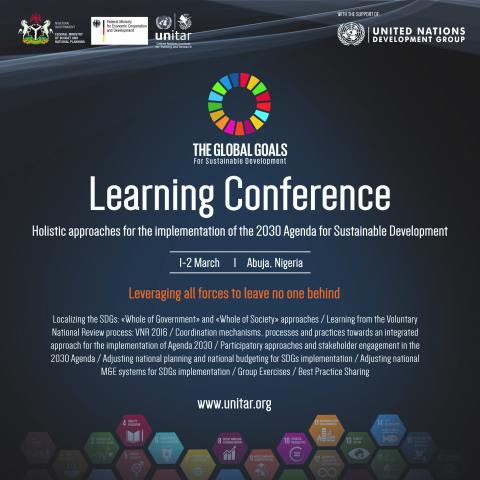
Holistic Approaches for the Implementation of the 2030 Agenda
In the framework of its initiative “Capacity for the 2030 Agenda”, UNITAR organized a learning conferences on “holistic approaches for the implementation of the 2030 Agenda” for African Least Development Countries (LDCs). This conference specifically targeted government officials from the 17 English-speaking African LDCs and took place in Abuja, Nigeria on 1 - 2 March 2017.
The conference took into account key issues faced by LDCs in Africa, how public institutions get mobilized to implement the 2030 Agenda, integrated planning and policy-making, monitoring and evaluation for the SDGs and stakeholder engagement.
In 2015, UNITAR developed - jointly with the UN Development Group (UNDG) - a toolkit entitled “Preparing for action national briefing package” to enable national experts to act as facilitators and launch national SDG roll-out workshops. This package is currently available in 4 UN languages and has been successfully tested with UNITAR’s support in several African LDCs, as well as middle-income countries in other world regions.
The training conference “Holistic approaches for the implementation of the 2030 Agenda” further elaborated and expanded this toolkit. It aimed to fill in the specific training and learning gaps identified by the Governments of LDCs drawing on the expertise of the UN and key partner institutions, in particular UNDP and UNDG Resident Coordinators.
1. state the main challenges raised by the mainstreaming and implementation of the 2030 Agenda - Session 1: Localizing the SDGs: "whole of government" and "whole of society" approaches
2. identify peers that are facing similar challenges in other countries - Session 2: Knowledge exchange board
3. identify processes and practices conducive to integrated decision-making - Session 3: Promoting integrated decision-making: coordination machanisms, analytical tools, processes and practices
4. map key national stakeholders - Session 4: Engaging stakeholders for the implementation and review of the 2030 Agenda
5. identify the main challenges related to the implementation of both Agenda 2030 and Agenda 2063 - Session 5: Holistic approaches to Agenda 2030 and Agenda 2063
6. identify innovative approaches and sources of financing - Session 6: Financing for the SDGs and budgeting overview
7. describe key requirements for an effective national Monitoring & Evaluation system to review progress in achieving the SDGs - Session 7: The 2030 Agenda and the role of national Monitoring & Evaluation
Session 1: Localizing the SDGs: "whole of government" and "whole of society" approaches
Session 2: Knowledge exchange board
Session 3: Promoting integrated decision-making: coordination machanisms, analytical tools, processes and practices
Session 4: Engaging stakeholders for the implementation and review of the 2030 Agenda
Session 5: Holistic approaches to Agenda 2030 and Agenda 2063
Session 6: Financing for the SDGs and budgeting overview
Session 7: The 2030 Agenda and the role of national Monitoring & Evaluation
Governments officials in charge of the implementation of the 2030 Agenda in 17 African LDCs and Nigeria

